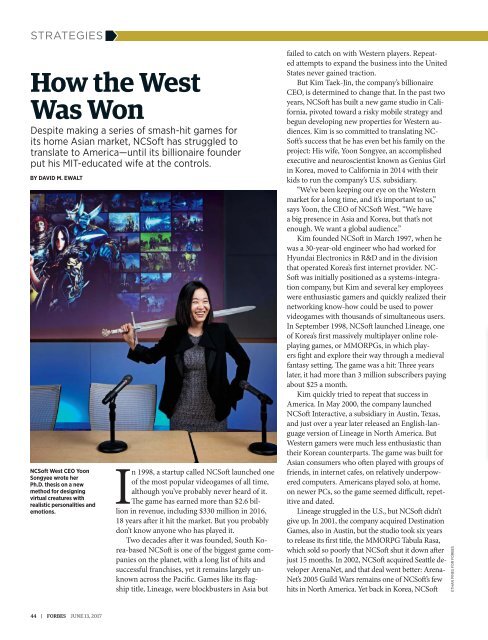Create successful ePaper yourself
Turn your PDF publications into a flip-book with our unique Google optimized e-Paper software.
STRATEGIES<br />
How the West<br />
Was Won<br />
Despite making a series of smash-hit games for<br />
its home Asian market, NCSoft has struggled to<br />
translate to America—until its billionaire founder<br />
put his MIT-educated wife at the controls.<br />
BY DAVID M. EWALT<br />
NCSoft West CEO Yoon<br />
Songyee wrote her<br />
Ph.D. thesis on a new<br />
method for designing<br />
virtual creatures with<br />
realistic personalities and<br />
emotions.<br />
In 1998, a startup called NCSoft launched one<br />
of the most popular videogames of all time,<br />
although you’ve probably never heard of it.<br />
The game has earned more than $2.6 billion<br />
in revenue, including $330 million in 2016,<br />
18 years after it hit the market. But you probably<br />
don’t know anyone who has played it.<br />
Two decades after it was founded, South Korea-based<br />
NCSoft is one of the biggest game companies<br />
on the planet, with a long list of hits and<br />
successful franchises, yet it remains largely unknown<br />
across the Pacific. Games like its flagship<br />
title, Lineage, were blockbusters in Asia but<br />
failed to catch on with Western players. Repeated<br />
attempts to expand the business into the United<br />
States never gained traction.<br />
But Kim Taek-Jin, the company’s billionaire<br />
CEO, is determined to change that. In the past two<br />
years, NCSoft has built a new game studio in California,<br />
pivoted toward a risky mobile strategy and<br />
begun developing new properties for Western audi<br />
ences. Kim is so committed to translating NC-<br />
Soft’s success that he has even bet his family on the<br />
project: His wife, Yoon Songyee, an accomplished<br />
executive and neuroscientist known as Genius Girl<br />
in Korea, moved to California in 2014 with their<br />
kids to run the company’s U.S. subsidiary.<br />
“We’ve been keeping our eye on the Western<br />
market for a long time, and it’s important to us,”<br />
says Yoon, the CEO of NCSoft West. “We have<br />
a big presence in Asia and Korea, but that’s not<br />
enough. We want a global audience.”<br />
Kim founded NCSoft in March 1997, when he<br />
was a 30-year-old engineer who had worked for<br />
Hyundai Electronics in R&D and in the division<br />
that operated Korea’s first internet provider. NC-<br />
Soft was initially positioned as a systems-integration<br />
company, but Kim and several key employees<br />
were enthusiastic gamers and quickly realized their<br />
networking know-how could be used to power<br />
videogames with thousands of simultaneous users.<br />
In September 1998, NCSoft launched Lineage, one<br />
of Korea’s first massively multiplayer online roleplaying<br />
games, or MMORPGs, in which players<br />
fight and explore their way through a medieval<br />
fantasy setting. The game was a hit: Three years<br />
later, it had more than 3 million subscribers paying<br />
about $25 a month.<br />
Kim quickly tried to repeat that success in<br />
America. In May 2000, the company launched<br />
NCSoft Interactive, a subsidiary in Austin, Texas,<br />
and just over a year later released an English-language<br />
version of Lineage in North America. But<br />
Western gamers were much less enthusiastic than<br />
their Korean counterparts. The game was built for<br />
Asian consumers who often played with groups of<br />
friends, in internet cafes, on relatively underpowered<br />
computers. Americans played solo, at home,<br />
on newer PCs, so the game seemed difficult, repetitive<br />
and dated.<br />
Lineage struggled in the U.S., but NCSoft didn’t<br />
give up. In 2001, the company acquired Destination<br />
Games, also in Austin, but the studio took six years<br />
to release its first title, the MMORPG Tabula Rasa,<br />
which sold so poorly that NCSoft shut it down after<br />
just 15 months. In 2002, NCSoft acquired Seattle developer<br />
ArenaNet, and that deal went better: Arena-<br />
Net’s 2005 Guild Wars remains one of NCSoft’s few<br />
hits in North America. Yet back in Korea, NCSoft<br />
ETHAN PINES FOR FORBES<br />
44 | FORBES JUNE <strong>13</strong>, <strong>2017</strong>


















